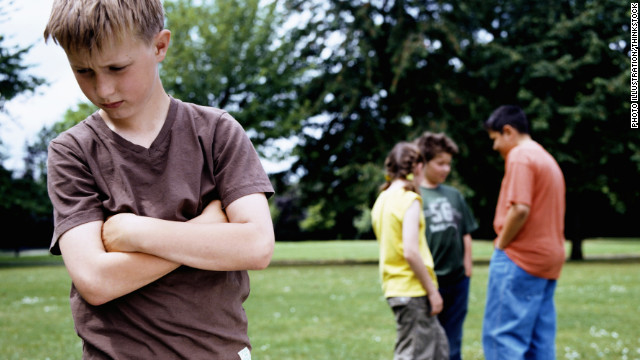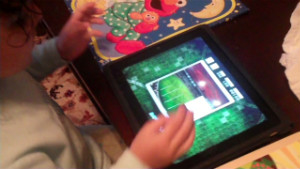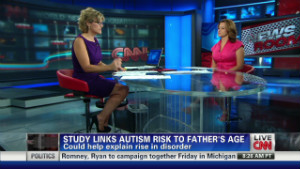It took me a while to agree to try Focalin. We tried Intunive (Tenex) in the Spring, and did not see any progress, even after increasing to 2 dosages per day (1 full pill). The developmental ped prescribed Focalin in May and after reading the side effects (on my handy Psych Drugs app), I was afraid. The main cause for concern was seizures. This came at a time when he had his 3rd normal EEG (3 years in a row!) and the neuro (my developmental ped's husband) wanted to start decreasing his Keppra. Once I told him about his wife's script for Focalin, he said to not decrease the Keppra.
I went back for a med check with the developmental ped and told her I did not start the med and had some concerns. She assured me it would work and that we would monitor the side effects. Her husband said he only had 1 patient with side effects from Focalin. Then, I found out after school started that the CEO of the company I work for had success with her son. That's actually what helped give me the confidence to try it. Plus, I spoke to Joey's reading teacher who said it was hard to keep his attention.
We started it on Labor Day (9/3) and it's been more than 3 weeks. He seems more attentive at home. I will see how his teachers rate him on their data collection sheets.
Ugh! Meds scare me but I'm happy to report he seems to be doing ok so far. This is the type of med that he doesn't have to be on for long. He can take it the day he needs to be more attentive. So he only gets it on days he is in school.
This blog is about my 8 year old son Joey and our journey into diagnosing his PDD-NOS and Epilepsy, learning from it and helping others, as well as being a great place to store all the information I gather along the way.
Wednesday, September 26, 2012
Friday, September 14, 2012
Saturday, September 8, 2012
Medical ID Bracelets
The ladies at Lauren's Hope created this wonderful bracelet. I thought some of my readers could benefit from this.
Be sure to check out the other bracelets and dog tags. Really great idea!!
http://www.laurenshope.com/product/2079/JB001/jelly-band-silicone-medical-alert-bracelet/size

Be sure to check out the other bracelets and dog tags. Really great idea!!
http://www.laurenshope.com/product/2079/JB001/jelly-band-silicone-medical-alert-bracelet/size

Autism and bullying
I wish I could stay in my bubble and think this doesn't exist. I liked the suggestion for social groups towards the end of the article.
Link:
http://www.cnn.com/2012/09/07/health/autistic-kids-bullied-time/index.html?hpt=us_c2
 (TIME.com) -- A new study finds that children with autism
spectrum disorders are bullied far more often than their typically developing
peers — nearly five times as often — but parents of autistic kids think the rate
is even higher than that.
(TIME.com) -- A new study finds that children with autism
spectrum disorders are bullied far more often than their typically developing
peers — nearly five times as often — but parents of autistic kids think the rate
is even higher than that.
Link:
http://www.cnn.com/2012/09/07/health/autistic-kids-bullied-time/index.html?hpt=us_c2
Why autistic kids make easy targets for school bullies
By Maia Szalavitz, TIME.com
updated 8:40 AM EDT, Fri September 7, 2012

Fear often leads to exclusion and derision,
experts say.
STORY HIGHLIGHTS
- Study finds 46% of autistic children in middle, high school are victimized
- People with autism have trouble recognizing social cues, reporting bullying
- Highest functioning children in the study were at greatest risk
In the study, about 46% of
autistic children in middle and high school told their parents they were
victimized at school within the previous year, compared with just over 10% of
children in the general population.
Calling it a "profound public
health problem," lead author Paul Sterzing of Washington University in St. Louis
told the New York Times that the "rate of bullying
and victimization among these adolescents is alarmingly high."
Many people with autism have
trouble recognizing social cues, which makes them awkward around others. They
also often engage in repetitive behaviors and tend to be hypersensitive to
environmental stimuli, all of which makes kids with the disorder ripe targets
for bullies who home in on difference and enjoy aggravating their victims.
About a third of autism cases are
severely disabling — those affected may suffer from low IQ and be unable to talk
— but most autistic people have average or high intelligence and many can
function well, if their social and sensory issues are appropriately
addressed.
That may help explain why the
highest functioning children in the current study were at greatest risk of being
bullied. While their social awkwardness was more obvious because they actually
interacted more with mainstream peers, this made their actual disability less
visible, likely making their condition harder for their peers to understand.
Children with autism who could
speak well, for example, were three times more likely to be bullied than those
whose conversational ability was limited or absent.
Further, those who were mainly
educated in mainstream classrooms were almost three times more likely to be
bullied than those who spent most of their time in special education.
The research, published in the
Archives of Pediatric and Adolescent Medicine, involved survey
data from 920 parents of autistic children, who were asked about their
children's experience of bullying.
About 15% of autistic children
were reported to be bullies themselves — roughly the same rate as in the general
teen population — and 9% were both bullies and victims. Bullying, which can take
the form of teasing, exclusion, humiliation or physical assault, can lead to
depression and other mental health problems, along with poor grades and even
physical illness in victims because of the severe stress it causes.
Parents of autistic children
think that the true rates of victimization are far higher than what the study
found, and that the rates of perpetrating bullying are lower, precisely because
autism disorders are characterized by an inability to read subtle social cues
and by difficulty with communication.
In order to report being
bullied, you need to understand when you're being targeted, for example; in
contrast, you also need to understand and effectively deploy harassing social
information in order to be a bully — things that autistic children generally
cannot do.
"The only thing I can figure out
is that maybe the parents are misinterpreting their children's clumsy attempts
[to socialize]," says Eileen Riley-Hall, a high-school teacher with an autistic
daughter and author of "Parenting Girls on the Autism Spectrum: Overcoming the
Challenges and Celebrating the Gifts," regarding the rate of bullies among
autistic kids in the new study.
"I think of bullying as
systematic manipulation. But [autistic children] are so candid, they're
typically not capable of that kind of forethought and malice."
Impaired language skills and
inability to read social cues also mean that many autistic children are bullied
without ever realizing it or being able to report it.
Riley-Hall recalled an incident
involving her daughter in elementary school. "Little boys were getting her to
say dirty words and laughing at her. She thought this was a good thing and that
they were being friendly, but they were really making fun of her," she says,
describing how another girl, who knew it was wrong, told the teacher. But until
the classmate reported it, Riley-Hall had no idea that her daughter was being
bullied.
With recent national focus on
the toll of school bullying, including bullying-related suicide, many school
districts are updating their anti-bullying policies and states are giving the
issue renewed legislative attention.
Research finds that the best
anti-bullying programs are comprehensive, involving the entire school and not
just individual students. Programs that work well tend to encourage a warm
school environment in which diversity is celebrated; they also rely on adults at
the school, from the principal to the lunch ladies, to set a tone that clearly
indicates that bullying isn't acceptable.
Studies find that students in
schools that create such a welcoming atmosphere not only perform better
academically, but also have lower rates of behavior problems like alcohol and
drug use.
But despite efforts to encourage
inclusion, acceptance of students with disabilities remains low overall.
"There's still a sense that they are not as fully human as other people," says
Riley-Hall.
Another factor that often leads
to exclusion and derision is fear. "We have many generations who have had no
personal experience with people with special needs, and they fear them,"
Riley-Hall notes. "They pass that ignorance on to their children."
As the study's authors conclude:
"Inclusive classrooms need to increase the social integration of adolescents
[with autism] into protective peer groups while also enhancing the empathy and
social skills of typically developing students towards their peers with [autism]
and other developmental disabilities."
Indeed, although autistic people
are often claimed to lack empathy, their problems usually relate to an inability
to understand the minds of others— not an actual lack of care when they know
someone is suffering.
Meanwhile, people without autism
aren't supposed to be impaired in understanding others' pain, so what's our
excuse?
This story was originally
published on TIME.com
Thursday, September 6, 2012
Who's the boss?
On the drive to school this morning, Joey says, "I've been thinking...you should work less so you can spend more time with me." I haven't been working as much but I've been studying a lot. Either way, he's the boss and I like his idea.
Sunday, September 2, 2012
Going the distance
As Joey was getting out of his bath tonight, I told him his Daddy texted me to see how he was doing. Joey quickly replied, "I miss Daddy so much. I want to spend a lot of weeks with him." He then asked me how many weeks Daddy had been gone and I said, "Probably about 25," and he responded with, "I want to spend 25 weeks with him."
I told him that Daddy would only be home for about 2-3 weeks, and he said, "make it 3."
He is growing so much in being able to talk about his Dad being gone and how he misses him. He gets excited when he talks about him. I don't think he harbors anger or resentment. I don't think he's capable of it yet. He shows true excitement for seeing his Dad. I love that.
I can't wait until his Dad returns home too, because I know it fills Joey's heart and completes him in a way that I never will. And that I should never try to. Every boy needs a Daddy, and my boy is extra lucky because he has 2.
I told him that Daddy would only be home for about 2-3 weeks, and he said, "make it 3."
He is growing so much in being able to talk about his Dad being gone and how he misses him. He gets excited when he talks about him. I don't think he harbors anger or resentment. I don't think he's capable of it yet. He shows true excitement for seeing his Dad. I love that.
I can't wait until his Dad returns home too, because I know it fills Joey's heart and completes him in a way that I never will. And that I should never try to. Every boy needs a Daddy, and my boy is extra lucky because he has 2.
Saturday, September 1, 2012
Gummy donuts
Upon being asked why he "needed" gummy lifesaver "donuts," Joey said, "I need them for an experiment with my toy shark. To see if they will pop out of his belly." He never fails to surprise me.
Subscribe to:
Posts (Atom)


